The crowd just kept growing. Mothers carrying their babies, toddlers flanked by older brothers and sisters, fashionable teenage boys, elderly women seemingly unaware of all the eyes on them as they walked over the wide stage to the seats that awaited them under the shade of the tents. Colour filled the vista, the bright blue sky and hot sun reflecting the lucent green of sugarcane and the mosaic of colourful clothes worn on hundreds of bodies, excited by the loud Ugandan pop music and impressive dancers performing before them.
There was a rhythm to the day. As soon as the cyclists were set off on their loop around neighbouring villages, the crowd began to grow and each return they made past the venue caused a wave of people to run to the road to see them pass, each time accompanied by a larger number of motorbikes carrying up to four adults, waving branches and blasting music from their stereos.
This is village advocacy.
Suubi (Hope) Health Center was opened in 2014 in the village of Budondo, Luuka District in Eastern Uganda. It was the culmination of many years of work by a local family who believe that their community deserves the best maternal health care. Before any buildings were built, the Mukisa family had already trained a group of community health workers, now known as ‘The Suubi Women’ and worked for years with them spreading positive health messages in the local area by way of participatory theatre.
Bernard Mukisa, an outspoken advocate of women's rights in both speech and action, carries a vision for his village that is slowly coming into reality. His wife Teopista lives every day for others, and calling Budondo home, has an intimate knowledge of the challenges and joys that the people - especially the women - around her face. These two have been examples for their eight adult children, all of whom have given their whole hearts along with their time, education, money and careers to the work of Suubi.
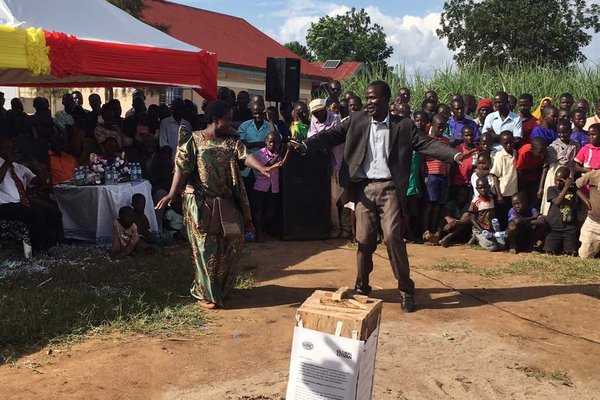
Uganda is a country in which a woman and her child are at very high risk of losing their lives during or just after delivery. 5,500 women (UN 2015) and an astonishing 30,000 newborn babies die every year in Uganda during or in the period just after childbirth (WHO 2015). The Mukisas devote every day of their lives to the belief that this can and will change, and that a world free of infant and maternal mortality is possible.
Since its opening in 2014, 398 women have delivered babies at Suubi. That is 398 women who may have lost their lives and the lives of their babies on the 25km long bumpy road to the next nearest facility. 398 women who may have stayed at home for lack of money and fear of mistreatment at other health care facilities. 398 women who may have gone to a neighbouring traditional birth attendant, whose limited knowledge often means that otherwise manageable complications during delivery become fatal. Because of Suubi, these 398 women experienced the kindness, cleanliness and care that every woman in the world deserves. They are now enjoying life with their children under the continued care and attention of the Suubi staff.
On Friday June 16, 2017, in celebration of The International Day of the African Child and in partnership with Global Citizen, the team at Suubi hosted a day of community outreach and advocacy. In attendance, among other local politicians, was the Luuka District Commissioner, who has a direct line to the President of Uganda. The aim of the day was to challenge these politicians to do more for maternal and child health services in the district and to lobby for more change country wide.
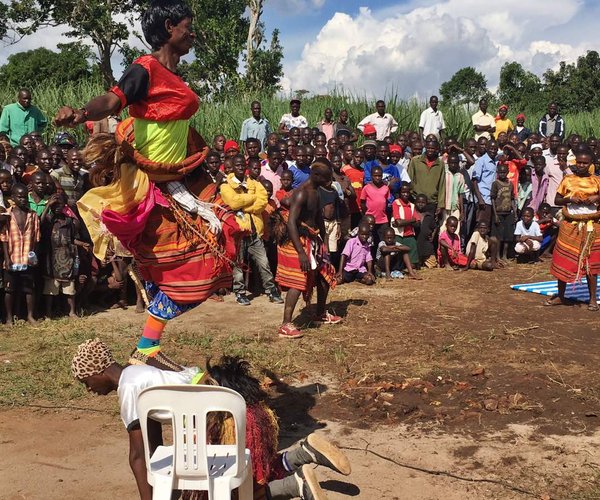
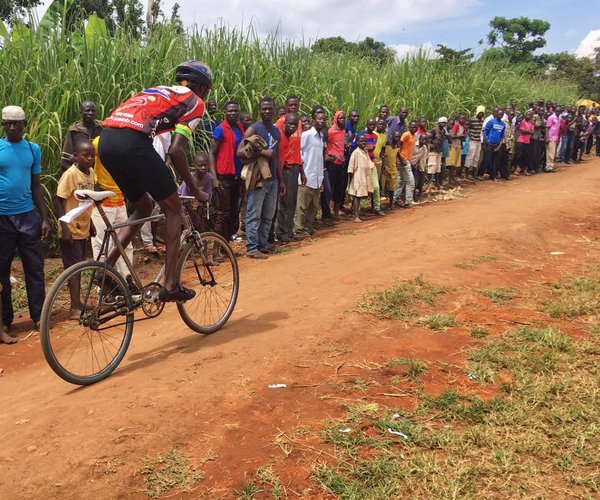
Dancers danced, comedians made people laugh, singers sang with flair and emotion and the crowd cheered for Suubi. As the traditional dancers, bedecked in animal hair belts and cuffs, finished their performance, the staff and volunteers of the health center were called to the front. In a line they danced and waved rhythmically in the sun as the crowed roared for them, their value to the community undisputed. When Charles Lubega, one of Suubi’s clinical officers, began to speak, he conveyed a clear message.
“We all have a responsibility. These children are all of our children. These women are all of us.”
Denis Mukisa, the Mukisa’s third born son, Suubi’s brilliant program manager and the brains behind much of the progress that has been made at the center, then rose, flanked by his entire family. Directly addressing the politicians, he reminded them of their responsibility to Ugandan mothers and children. He presented Global Citizen’s petition to them and reminded them of the multitudes of people who are already working to provide safe maternal care, including hundreds of community members in Budondo. One by one, the politicians arose and pledged their support.
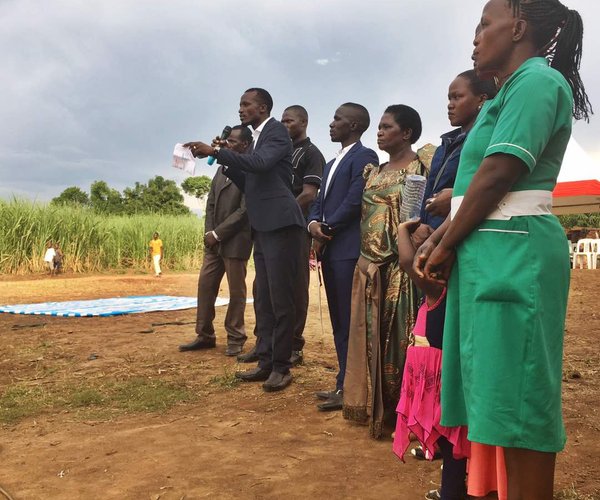
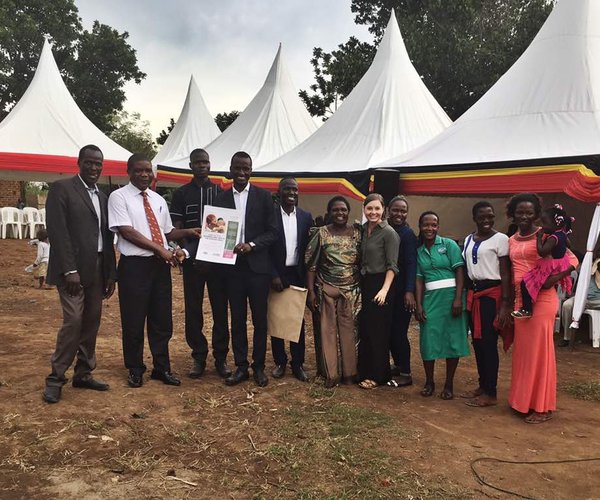
We will have to wait and see if the politicians follow through on their promises. Suubi has partnered with the government on a vaccination program, but there is so much more that they could and should do. By working to build Suubi and save so many lives, the Mukisas are demonstrating that things need not stay the same.
Suubi is built on the principle that those who lack institutionalised ways to speak truth to power and implement positive change still have the ability and the responsibility to try. When they succeed, as the Mukisas have, they prove that the local community holds the truth.
A woman in Budondo expecting a baby can listen to a village health worker who has given her a voucher for free antenatal care and make a visit to Suubi, saving her baby’s life. A father in Budondo can be a support to his wife and attend family planning sessions with her. His wife can then join the committee formed to advise the leadership of Suubi of the challenges facing people in the village. These people may not be politicians, but their choices will change the outlook for women and children in Uganda.
A program manager at Suubi can teach women that it is not fair and not inevitable that they should be put in danger during childbirth. She can teach them about ways of pressuring their politicians to make changes. They can organize. They can protest. She and her organization can provide the quality healthcare that people in Uganda deserve.
People all around the world can join with this work, even those who feel powerless. They can give to it - of their time, their energy, their money. They can pressure their own governments to use what powers they have to ensure that our world becomes free of maternal mortality. Doctors and nurses can treat, scientists can find new life-saving solutions. Journalists can report on it, photographers and filmmakers can document it, celebrities like French Montana and The Weeknd can use their platform to spread the message and to strengthen locally-owned programs. Aid agencies, NGOs and civil society organizations can advocate and work for change.
Politicians must take time to genuinely listen to their electorate - to those they are there to serve and with whom their power lies. They must work towards change in electoral and governance systems, so that the voices of all are more effectively heard. They must allocate more funds to maternal health care and resources to making sure those funds are used effectively.
This ecosystem of actors - of people - listening to one another and doing their part with humility, integrity and cooperation, can build strong and effective solutions to the challenges faced in achieving the world that the Mukisa family is tirelessly working towards - one free of maternal mortality.
No one actor can achieve this alone. No one has the whole answer. Each one of us has something unique and valuable to give, but we must also start by listening to those closest to the issues. The voice of a mother in Budondo is the one that gives legitimacy to the voice of the politician who represents her. Her voice must be the one ringing in the ear of the aid agency director designing programs to help her, and it must also be the one recommending that her pregnant sister seeks support at Suubi Health Center.
On the 16th of June, the staff at Suubi challenged the politicians who represent them to do more, and challenged the hundreds of people in their community to stay involved. But they were also challenging you, me, your local politician, international celebrities and everyone in between.
We all have a place in the ecosystem. We each have something we must do.